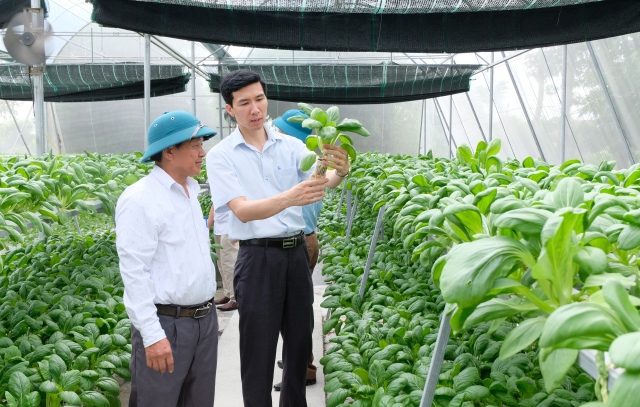Hanoi promotes safe agriculture
Encouraging farmers to embrace biological alternatives and herbal solutions has resulted in an impressive adoption rate of over 60% for biopesticides in the city's farming sector.
In Hanoi, a variety of agricultural production models use pesticide-free practices, resulting in a shift to farming techniques that are more environmentally friendly and ensure the production of safe, premium-quality goods for local consumers.
| Hoang Quoc Chien's hydroponic vegetable production model in Phu Cuong Commune, Soc Son District, has proven to be highly economical. Photo: Nguyen Tung/The Hanoi Times |
Trinh Thi Nguyet, Director of Dong Phu Organic Agriculture Cooperative in Chuong My District, pointed out that her cooperative manages over 40 hectares of organic rice cultivation.
Throughout the entire planting and growing process, pesticides are deliberately avoided. This approach has consistently positioned the cooperative's rice at prices 2.5-3 times higher than conventionally grown rice, yielding revenues of more than VND160 million (US$6,717) per hectare.
"To ensure transparency in the production process, the cooperative has installed field cameras that allow managers to monitor activities easily," Nguyet said.
Since 2017, Hoang Quoc Chien from Phu Cuong Commune in Soc Son District, along with several other farming households, has been involved in a hydroponic model to grow vegetables in an area of 2,000 m2.
The vegetables thrive in a greenhouse environment using cutting-edge technology such as automatic temperature sensors, air convection fans, drip irrigation systems, and nutrient circulation to support plant growth.
"The absence of pesticides throughout the production cycle ensures the safety of the vegetables," says Chien.
The high-tech farm currently produces about three tons of hydroponic vegetables per month, with an average selling price of VND35,000 ($1.47) per kilogram. By focusing on building strong links with distributors, the farm maintains stable production. As a result, the annual income from vegetable sales is approximately VND1 billion ($42,000).
Over the years, Hanoi's agricultural sector has worked with local authorities to disseminate information and advise farmers on minimizing the use of toxic chemical pesticides. Farmers have been encouraged to use biological alternatives and herbal solutions. This initiative has resulted in a remarkable biopesticide adoption rate of over 60% in the city's agriculture.
In addition, the agricultural sector conducts regular inspections of agricultural input production and trading facilities, both thematically and sporadically, especially when there are indications of violations.
To promote the use of biological pesticides and herbal alternatives instead of chemical substances, Nguyet of Dong Phu Organic Agriculture Cooperative emphasized the need for government departments and agencies to offer improved mechanisms and policies.
"These policies would support organizations, individuals, cooperatives, and enterprises engaged in agricultural production and business activities, including access to capital and preferential interest rates. This support would facilitate the expansion of production scales," Nguyen said.
Nguyen Manh Phuong, Deputy Director of the Hanoi Department of Agriculture and Rural Development, highlighted the ongoing collaboration between the agricultural sector and local communities to disseminate information and raise awareness about the importance of using organic pesticides and herbal solutions.
At the same time, local associations and community organizations have strengthened guidance for farmers to properly manage pesticide packaging in the fields, thereby reducing environmental pollution.
Phuong added that the agricultural sector has developed tailored recommendations for each type of crop, focusing on promoting healthy growth without excessive reliance on chemical fertilizers.
"In the long term, enterprises should strive to enhance and innovate production and processing technologies for biological crop protection products. These efforts aim to produce high-quality biological products that ensure efficacy, extended shelf-life, ease of use, affordability, and suitability for different agricultural conditions," said Phuong, noting that these improvements will, in turn, encourage farmers to adopt and replicate practices in line with VietGAP and organic farming models, especially in localities that were incorporated into Hanoi after the capital's administrative boundaries were expanded 15 years ago.
| Since the beginning of 2023, the Inspectorate of the Hanoi Department of Agriculture and Rural Development has conducted inspections of 94 enterprises involved in the production, trade, and use of fertilizers. These inspections have led to the detection of two violations, resulting in a total fine of VND39.5 million ($1,660) for selling substandard pesticides. At the same time, the establishments involved were publicized through mass media channels to inform the public and discourage the purchase and use of substandard, counterfeit, and imitation products that can harm crops. |













